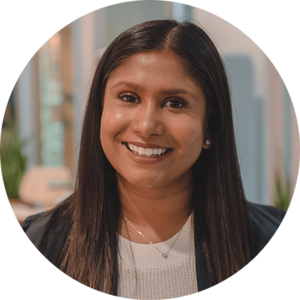Shelly-Ann Rampersad (BSc ’11) began studying Kinesiology with a pre-health specialization at Waterloo in 2006, knowing that she was interested in the health-care industry, but not knowing the role new technologies would play in her life.
Rampersad is now heading up the Canadian business for a global health technology startup, Florence, which recently expanded into Canada. The platform allows nurses and personal support workers to connect to available shifts in their local area and provides health-care facilities with a more transparent and cost-effective option to filling open, last-minute shifts. Previously, Rampersad was vice-president of clinical operations at Maple, a virtual health-care platform for online doctor visits.
The right fit
When she started her undergraduate degree, she thought she might become a doctor. Or, at least, that was front and centre for her as she saw her father, who was quite ill, interact with the health-care system on a daily basis. “He was in and out of hospitals,” says Rampersad, who immigrated to Canada with her Trinidadian parents when she was quite young.
“I thought Waterloo had a really outstanding Kinesiology program, and it also has a human cadaver lab and co-op work terms where I could get experience in the health field.” Also, she loved sports and got heavily into Dragon Boat racing when she was at Waterloo. Kinesiology seemed to be a good fit.
Her co-op education work terms led to fascinating medical research-related roles at the University Health Network, including Toronto General Hospital, as well as Sunnybrook and Hamilton Health Sciences Centre, where she had her first post-graduation job.
The departments she worked in ranged from rheumatology and anesthesia to orthopedic surgery. The subject matter was fascinating, but she didn’t feel it was what she wanted to do as a career.
She started to think deeply about she really wanted in life. “I had taken these research roles with plans to go to medical school. But did I really want to be a doctor or was that my father’s dream?” she says. “I realized it wasn’t for me.”
She switched paths and went to the Rotman School of Management at the University of Toronto, where she got her MBA in 2015. It led to a position as a management consultant at KPMG Canada.
“In consulting, you get to work on all sorts of different projects with different clients,” she says. She was part of a project in the Bahamas with a global team that worked on implementing the country’s National Health Insurance program. “It was an amazing opportunity – an incredible experience,” she says.
Expanding technology
 One of her connections thought she would be a perfect fit for a job at Maple, a company founded in 2015 with a virtual health-care platform to connect patients to doctors. Within two years, she was in charge of building and managing all the clinical operations at Maple, a company with rapid growth and numerous successes.
One of her connections thought she would be a perfect fit for a job at Maple, a company founded in 2015 with a virtual health-care platform to connect patients to doctors. Within two years, she was in charge of building and managing all the clinical operations at Maple, a company with rapid growth and numerous successes.
During her time there, she oversaw the launch of Canada’s first virtually staffed hospital ward in Prince Edward Island as well as the launch and expansion of the virtual care pilot platform in Nova Scotia for patients without a family doctor. Hospitals in Ontario, Nova Scotia and Prince Edward Island are now also using Maple’s technology to allow emergency room doctors to take some shifts from home to reduce wait times.
Now, as Canadian managing director for Florence, which matches nurses with open shifts in hospitals and long-term care homes, she will be leading the Canadian launch of a technology that has been a big success in the United Kingdom and France.
Top 100 Most Powerful
Although Rampersad didn’t intend to go into the startup world, she says the University of Waterloo’s robust startup ecosystem made her unafraid of taking a chance on these jobs. “Having been around people starting their own businesses, it felt natural.”
Last year, Rampersad was named in the Top 100 Most Powerful Women in Canada in the Mercedes-Benz Emerging Leaders category by the Women's Executive Network. “Behind every winner, there is a whole team and the organization they work with. I was happy we could bring awareness to the great work we were doing to advance accessibility for health care,” she says. Mentoring other young women, especially diverse women, is now close to her heart. “I believe in advocating for them and elevating them,” she says.
Her advice to them, and all students, is: Don’t worry about the end goal.
“The nature of work today is that you don’t have to be one thing and do one thing,” she adds. “A lot of it is just being open to opportunities, to being challenged, to learning,”







